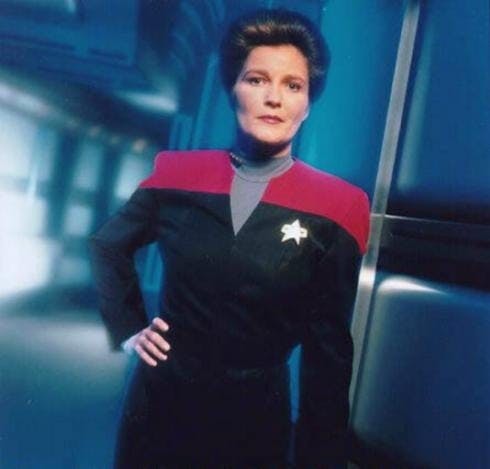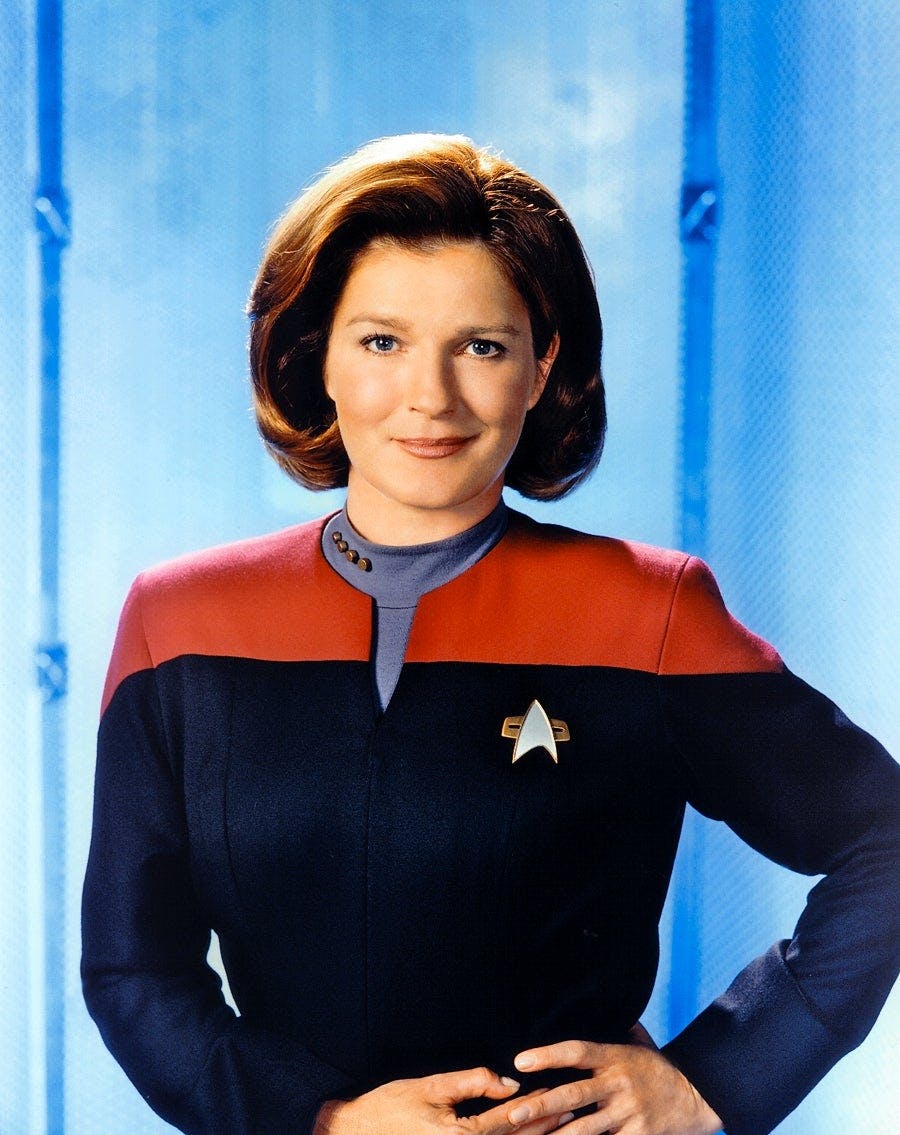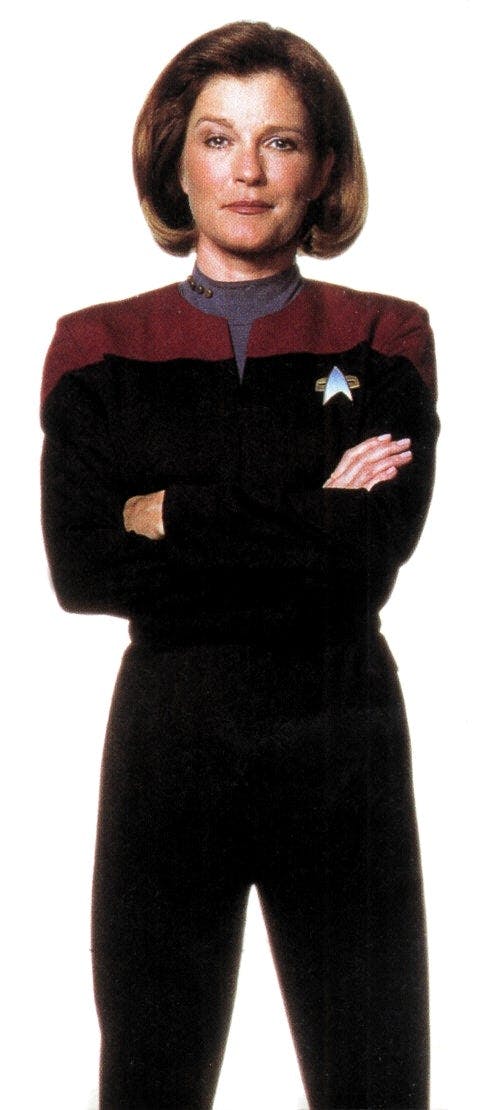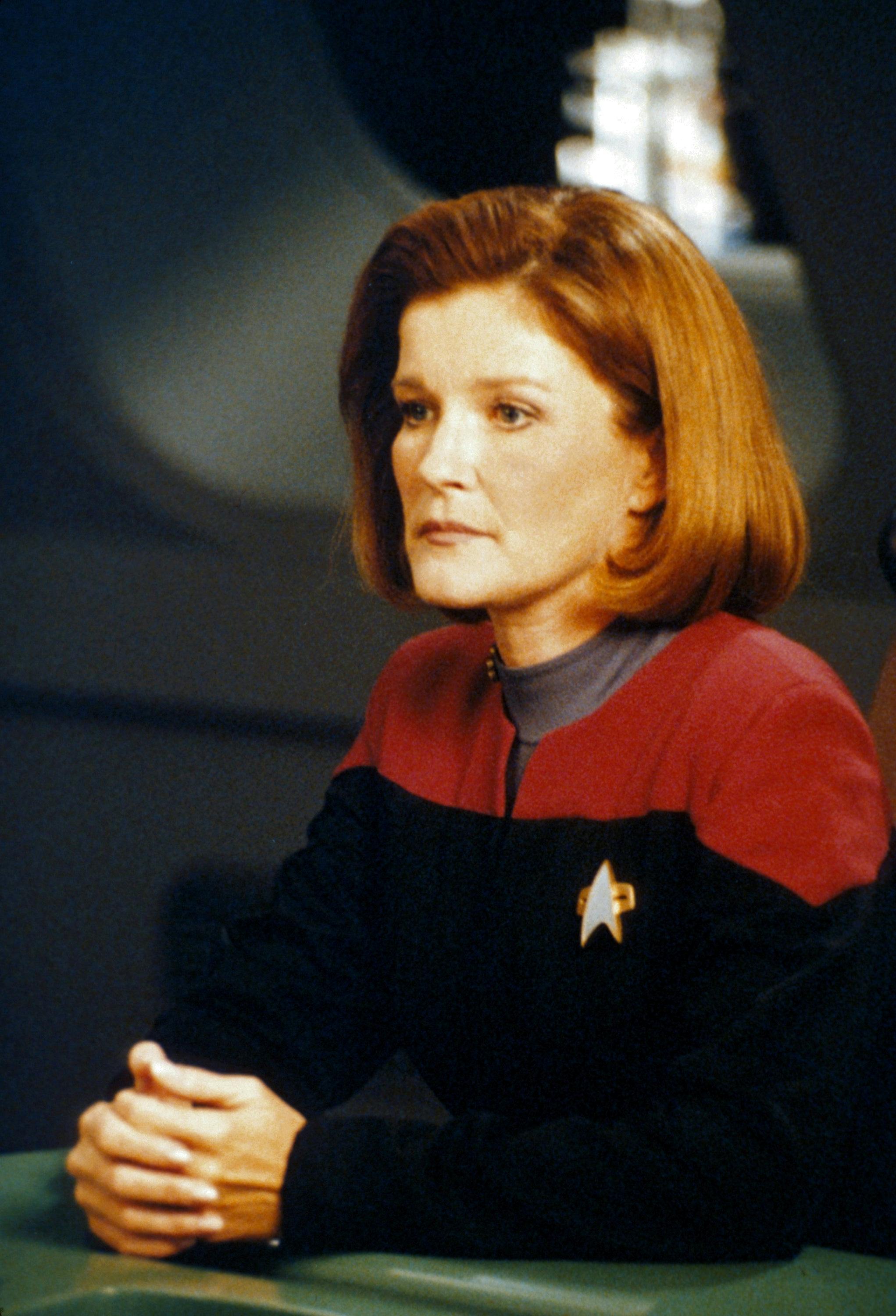Published Oct 27, 2020
EXCERPT: The Autobiography of Kathryn Janeway
Your first look at the newest book from Una McCormack.

StarTrek.com
In The Autobiography of Kathryn Janeway, the former Voyager captain (with an assist from author Una McCormack) reveals her career in Starfleet, from her first command to her epic journey through the Delta Quadrant leading to her rise to the top as vice-admiral in Starfleet Command. Discover the story of the woman who travelled further than any human ever had before, stranded decades from home, encountering new worlds and species. Explore how she brought together Starfleet and the Maquis as part of her crew, forged new alliances with species across the galaxy and overcame one of Starfleet’s greatest threats – the Borg – on their own remote and hostile territory. Get Janeway’s personal take on key characters such as Seven of Nine, her trusted friend Tuvok, new arrivals like Neelix and her second-in-command, Chakotay.
Read an exclusive excerpt from the book below, and purchase your copy now.
I went to the academy at the tender age of seventeen, a full year younger than most of the rest of my freshman classmates. The first couple of weeks were a blur. Everything was a rush of new names: names of the other new cadets, names of professors, names of classes… Then there was all the new information: sorting out timetables, signing up for extra credit, taking up a whole new slew of extracurricular activities, and, of course, socializing. There were so many interesting new people and more species than I had ever seen before. Sometimes it seemed that every second I encountered something new. This was why I had joined Starfleet—and this was just the Academy! Imagine what the real thing would be like.
I ended up in the lower half of the room ballot, which meant that I was sharing a room. I didn’t mind: it seemed like a good way to make a friend. As I had hoped would be the case, I hit it off immediately with my roommate, a quietly dry and extremely funny Betazoid named Nexa Ochiva who was specializing in xenolinguistics, and who persuaded me along to a huge number of extra lectures that I might not otherwise have even been aware of. Nexa came from a large family and knew how to share a room with someone else: we didn’t encroach on each other’s space, and, after a while, even our work patterns fell into sync. Thinking back now to those days, I smile to recall her quiet sigh, the signal for one of us to stand up and make a fresh pot of coffee.
Into the #Starchive with Captain Janeway's OG Uniform
We would then join each other to sit in the beaten-up armchairs in the middle of the room, and grumble about the latest set of problems in our astrometrics classes. Nexa and I remained good friends. We kept in touch during our various postings right up until Voyager was lost. It was one of the saddest pieces of news that I received on my return from the Delta Quadrant to learn that she had been killed during the latter stages of the Dominion War. I made it back to the Alpha Quadrant in time for our twenty-first annual reunion. There were a number of sad losses to our class, but Nexa’s was the one that hit me hardest.
Back to those early days. I worked out quickly that being the junior Janeway at Starfleet could cut both ways. On the one hand, I was keenly aware that what I did—for good or ill—inevitably reflected on my father. He had made a point of saying to me that I should not consider this—but I knew that others did. I worried too, given my comparative youth, that any failure or lapse would make people assume that I had won my place through his influence, rather than on my own merit. It’s a difficult situation to be in, and one that gives me some sympathy to others who are children of flag officers, following in the wake of successful and respected older relatives. My relationship with my own father was supportive, but I was still acutely conscious of his success ahead of me, and I did feel that I needed to prove that I was there because I deserved to be.

StarTrek.com
On the other hand, my familiarity with Starfleet procedure and protocol undoubtedly gave me a head start over many others. Such things were second nature: Phoebe and I had been present at many formal events from as soon as we were capable of attending without kicking up a storm. There were other benefits too, some of which I hadn’t predicted but proved among the most useful. For example, Mom, Phoebe, and I had often come up to San Francisco to visit Dad, and sometimes Granddad-in-town liked to tag along to visit his old haunts, see old friends, and show us the sights. Thanks to him, I knew shortcuts, places to hang out, and, in general, campus felt like a familiar place rather than bewildering. Almost an extension of home. That kind of local knowledge is helpful in your first weeks (as long as you don’t show off): it gives you confidence, and it’s a genuine help to your new friends to be able to tell them how to find the seminar room they’re anxiously hunting.
With Nexa as company and my first friend, I settled quickly in my room. I sometimes missed my home and family so much that I felt almost queasy with longing for them, while simultaneously luxuriating in the fact that I was an adult at last. Sure, the schedules of classes and other activities meant that the days were still thoroughly timetabled (very much like school), but otherwise my life was mine to lead as I chose: where and what I ate; whether or not to work on free days; how to spend my evenings, and who with. Nexa had a knack for one-to-one conversations, making people feel special and welcome. I was great with groups, making people feel like they were part of a great gang. The combination worked. We soon acquired a large group of friends, and a favored spot to meet for study and socializing. This was a coffee house slightly off the beaten track that Grandad-in-town had spied while we were in San Francisco for the entrance exams. It was called the Night Owl. You reached it via a shortcut behind the parrises squares courts: there was a gap in the hedge there (I assume this had been left there deliberately, out of pity for sleep-deprived cadets anxious to get their caffeine fix; the academy groundskeeper, Boothby, as you shall learn shortly, would certainly not have missed a gap in the hedge), then snuck two blocks along a back street, and there it was. Somewhat shabby, large enough for many tables where groups of cadets hunkered down to study or else irritate the life out of friends who were trying to study and didn’t want to listen to your idle chatter. The Night Owl served the third-best coffee I have ever tasted. (For the record, the best was the espressos I drank on that family holiday in Italy; the second best was the cup I had on arriving back in the Alpha Quadrant. By any general standards, that was not a great cup of coffee but… Oh, the smell! The taste! Nirvana!)
Captain Janeway Loves Her Coffee
Coursework was a heavy burden, but I stuck at it, and I did well in classes. In part, this was because I was playing to my strengths, specializing in the sciences, and also taking classes and lectures to help me onto the command track once I had enough experience under my belt (I have always enjoyed giving orders). In part, to give myself credit, this is because I worked damn hard! I didn’t want to let myself or my father down; I wanted to be the best I possibly could be… and I also didn’t want to miss out on anything. Nexa, knowing that I was fascinated with first-contact scenarios, persuaded me to come along to an advanced communications course run by Professor Hendricks, where each week was devoted to learning from scratch a nonverbal form of communication. This was my first introduction to gestural languages, including ASL, and chromolinguistics. I know that one or two of my professors looked askance at my taking yet another extra class, not least as my conversational Klingon remained something of a joke, but the principles I learned in that class turned out to be of huge benefit in the Delta Quadrant: how to grasp rapidly the fundamentals of a language, and use that knowledge to make grounded extrapolations about the culture within which that language was used. The Delta Quadrant was a baptism of fire as far as first-contact scenarios went: we were flying by the seat of our pants in so many ways. That extra class came in handy many times.
As ever, I tended to take on a great deal, probably slightly too much, often burning the candle at both ends and pulling all-nighters to get through study commitments while maintaining my social life. I did get a note from Dad, toward the end of my first year, that said: “Remember to rest. A Starfleet officer cannot survive on caffeine alone.” And I had not forgotten our conversation after the dreadful tennis match, and I decided I should try to find a way to relax. The Academy grounds proved a godsend here, as I think they have for many overworked cadets, not least because being in the garden reminded me of home, and my mother. One summer afternoon, tired after a long morning’s seminar on fractal calculus, and fretting about the forthcoming exam (Patterson’s exams were the stuff of nightmares), I found myself sitting in the garden, simply trying to be…

StarTrek.com
My eyes closed, but still I couldn’t rest. All I could see were those damn equations, flashing in front of me: fractals, never-ending, always getting deeper and deeper with no resolution… I was dreading the test… And then I heard a voice.
“Patterson,” the voice said.
I opened my eyes and found myself looking at a small, white-haired man whose gnarled face and hands suggested to me that he spent a lot of time outside. A veritable garden gnome.
“I beg your pardon?” I said.
“You,” said the gnome, “have the look of someone who is currently studying under Patterson.”
I stared at him. “How did you guess that?”
He smiled. “I’ve seen a lot of cadets come and go over the years,” he said. “I get used to their worries. And I know that the biggest worry for first years on the command track is passing Patterson’s fractal calculus class, and I also know that the exam is coming up soon. Am I correct, Cadet Janeway?”
Maybe it was because I was still half-asleep, but I was starting to get very bewildered by this whole encounter. It was as if I’d woken up in a strange enchanted land—Narnia, could read my mind and saw all my worries.
“Who are you?” I said.
“My name,” he said, “is Boothby.”
That broke the spell—a little. My father had mentioned Boothby, so had Granddad-in-town. Yes, I knew who this was—not a sorcerer or enchanter, but the gardener! I should clarify this—Boothby was not simply a gardener, but the head groundskeeper at the Academy and, given the size of the campus, this was a significant responsibility. How long had he been there? I don’t think anyone knows for sure.
“You’ve heard of me, I think,” he said. “And I hear your mother likes roses.”
I was amazed. Dad had said that Boothby knew everything about everyone, but this was pretty specialist knowledge. “How on earth did you know that?”
“I keep my ears open,” he said. He peered at me. I know that look well: it’s the one given by officers when they’re assessing whether you’re fit for a task. It’s a look I’ve given myself over the years. “Yes,” he said. “I think you’ll come in handy.”
“Come in handy—?”
He started to walk away. “In the rose garden, of course,” he said. “Come along, Cadet!” Well, I did what I was told. Boothby had this way about him… Next thing I knew, I was hard at work in the rose garden. How he persuaded me of this, I’ll never know: you’ll recall that I wasn’t much one for messing around in the mud. Still, you didn’t grow up with my mother—or, indeed, on a farm—without knowing how to find your way about a garden, so I daresay I did come in handy. After an hour or so, Boothby stood up, grunted in satisfaction, and said, “Good work, Cadet. You’ll do very well. I’ll expect you back here same time tomorrow.”

StarTrek.com
And then he headed off across the garden, before I could open my mouth to protest. I looked after him in horror. I didn’t have time to come and play in the garden! I had work to do; I had a goddamn fractal calculus exam with goddamn Patterson to goddamn pass! Still, the next afternoon, I didn’t think of disobeying. I left my friends in the Night Owl, saying something vague about an errand, and I went and spent a quiet hour in the garden, under Boothby’s watchful eye. And oh, what a blessing it turned out to be! A rest for my poor overworked brain; a real balm for the soul! Just that hour, once a day, doing nothing but using my hands and letting myself get away from my studies—it made all the difference. I found my focus got better; my concentration improved. And when the roses began to bloom, there were fresh flowers in my room every morning, courtesy of Boothby himself, as a thank you, so the man said, for my hard work. Nexa appreciated them too: she loved roses. When I finally did take the fractal calculus exam, not one of Patterson’s fiendish tricks could discompose me, and I did one of the best papers he’d seen. So thank you, Boothby, for helping me, as I know you have helped thousands of stressed cadets before me, and thousands after me, to get things back into proportion, and for all the wondrous roses.
At the end of the year, my marks in general were excellent: I was hardly outside of the top one percent, even in my weaker subjects. Altogether, when I packed up my room for the summer, and headed back to Indiana for a couple weeks, I was proud of what I had achieved. I could justly feel that I was at the Academy on my own merits, and not because of favors shown to me on my father’s account. But boy—was I ready for a break!
Going home that summer, even for so short a period, was an odd experience. I was glad to be back with my family, back in familiar places, but everything seemed smaller than I remembered. Messages I received from Academy friends told me that this was a common feeling, as if we had in that year outgrown our childhood homes. Still, I was glad of the rest. I was glad to enjoy Grandma’s cooking once again, and Grandpa’s strong black coffee. Most of all, I’m glad to say, I loved being back with Phoebe. If our quarrel had cleared the air between us, my absence for all those months had sealed the deal: we didn’t want to waste the time we had together on our old competition for attention; we wanted to be friends and counselors. Her art studies were progressing incredibly well; more and more she was exploring sculpture as her primary form, although I have to say that her watercolors and drawings of our locality—its wildlife, its landscape, not to mention its characters—were a huge joy for me. She was working on building a portfolio for entry to the Vulcan Academy of Art, with an eye on postgraduate work at an arts school on Trill. It was a pleasure to discuss her work with her, to see her increasing understanding of material form. What we both found interesting was how much my engineering interests overlapped with her hands-on approach to her artistic practice. It’s easy to say that we were opposites, but the real pleasure for me—and, so Phoebe tells me, for her—was finding how much we had in common.
That short break was tinged with sadness, however, as we said goodbye to my lovely Jess. She was old now—fifteen—and she slept most of the time. When I walked through the door, she lifted her head and thumped her tail at me, saying “hello,” and I had one more week with my old companion, sitting with her in the sunshine as I read and rested, and she lay beside me. I think she was waiting for me to come home again, because one morning, a week after I arrived, she didn’t wake up. I cried a great deal, and together Mom and Phoebe and I buried her in the garden, near the roses. My lovely Jess. I knew that given that I was heading into Starfleet, I would be taking posts onboard ship that were going to keep me away for long periods of time. I was not likely to get another dog for many, many years, and I knew the next one would have to be special. I was right there. Saying farewell to Jess felt at the time like the end of childhood for me.
Then it was time to say goodbye to the old homestead once again. I had an internship that summer in the office of Councilor T’Lan (don’t get too excited: mostly it was answering correspondence, although I did get some insight into the ongoing Bajoran refugee crisis); also a group of us were going hiking through the Andes. (My parents said, “Aren’t you supposed to be having a rest?”) And then, before I knew it, I was back at the Academy for my second year. More of the same—only more of it. Much more. More work, more exams, more coffee, and more fun, as much as I could possibly fit in between everything else. Time in the garden, decompressing, simply being among the roses. More and more complex equations, more and more complex command scenarios. They say about the Academy that the individual moments—as you’re trying to get a piece of written work done, or you’re fretting about a forthcoming test—pass extremely slowly, but that the months fly by. It’s true. Before I knew it, the second year and the second summer were over, and I was heading back for the second half of my Academy career. It struck all of us, heading back for our third year, that we were on the downward slope.

StarTrek.com
In the third year at the Academy, the nature of your studies alters somewhat. The number of large lecture classes gets fewer and fewer, and the barrage of in-class tests and end-of-semester exams reduces. Instead, you find yourself in smaller seminar groups and, if you’re on the command track, as I was, you do more and more practice scenarios. I did not fail to notice how many of these involved encounters with Cardassian ships. By this point, the border conflicts that we now call the Federation–Cardassian War were well established and showed no sign of slowing down. Our tutors were preparing us for this conflict. There were some practical additions, for example, field medicine and surgery courses. I have certainly used these in my later career (not to mention the memory-training techniques we were taught in H’ohk’s physiology classes). This background rumble of potential conflict was something we were all keenly aware of, and I recall numerous late-night conversations among friends, as we pondered what it might be like on the battlefield.
Life was full, and busy, and we were far enough away from graduating to be able to put aside our worries for a little while. By this point, I felt that I had the right balance, combining studies and my social life, and keeping at or near the top of my classes, getting downtime in the gardens. As long as nothing happened to disrupt my equilibrium…
Naturally, this was the moment I chose to fall in love.
